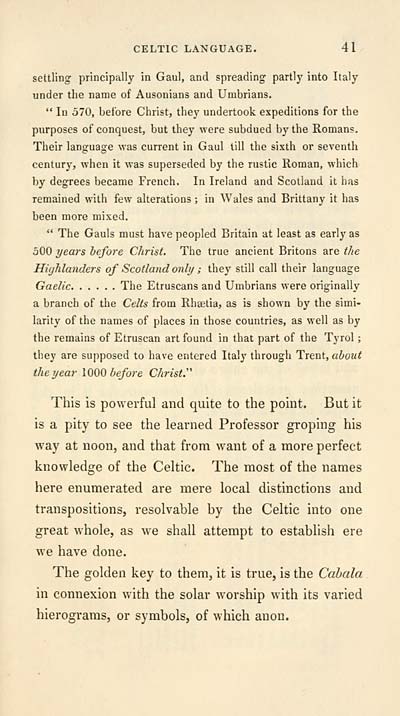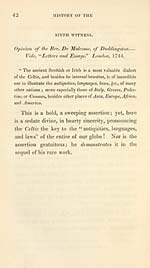Download files
Complete book:
Individual page:
Thumbnail gallery: Grid view | List view

CELTIC LANGUAGE. 41
settling- principally in Gaul, and spreading partly into Italy
under the name of Ausonians and Umbrians.
" In 570, before Christ, they undertook expeditions for the
purposes of conquest, but they were subdued by the Romans.
Their language was current in Gaul till the sixth or seventh
century, when it was superseded by the rustic Roman, which
by degrees became French. In Ireland and Scotland it has
remained with few alterations ; in Wales and Brittany it has
been more mixed,
" The Gauls must have peopled Britain at least as early as
500 years before Christ. The true ancient Britons are the
Highlanders of Scotland only ; they still call their language
Gaelic The Etruscans and Umbrians were originally
a branch of the Celts from Rhaetia, as is shown by the simi-
larity of the names of places in those countries, as well as by
the remains of Etruscan art found in that part of the Tyrol ;
they are supposed to have entered Italy through Trent, about
the year 1000 before Christ"
This is powerful and quite to the point. But it
is a pity to see the learned Professor groping his
way at noon, and that from want of a more perfect
knowledge of the Celtic. The most of the names
here enumerated are mere local distinctions and
transpositions, resolvable by the Celtic into one
great whole, as we shall attempt to establish ere
we have done.
The golden key to them, it is true, is the Cabala
in connexion with the solar worship with its varied
hierograms, or symbols, of which anon.
settling- principally in Gaul, and spreading partly into Italy
under the name of Ausonians and Umbrians.
" In 570, before Christ, they undertook expeditions for the
purposes of conquest, but they were subdued by the Romans.
Their language was current in Gaul till the sixth or seventh
century, when it was superseded by the rustic Roman, which
by degrees became French. In Ireland and Scotland it has
remained with few alterations ; in Wales and Brittany it has
been more mixed,
" The Gauls must have peopled Britain at least as early as
500 years before Christ. The true ancient Britons are the
Highlanders of Scotland only ; they still call their language
Gaelic The Etruscans and Umbrians were originally
a branch of the Celts from Rhaetia, as is shown by the simi-
larity of the names of places in those countries, as well as by
the remains of Etruscan art found in that part of the Tyrol ;
they are supposed to have entered Italy through Trent, about
the year 1000 before Christ"
This is powerful and quite to the point. But it
is a pity to see the learned Professor groping his
way at noon, and that from want of a more perfect
knowledge of the Celtic. The most of the names
here enumerated are mere local distinctions and
transpositions, resolvable by the Celtic into one
great whole, as we shall attempt to establish ere
we have done.
The golden key to them, it is true, is the Cabala
in connexion with the solar worship with its varied
hierograms, or symbols, of which anon.
Set display mode to: Large image | Transcription
Images and transcriptions on this page, including medium image downloads, may be used under the Creative Commons Attribution 4.0 International Licence unless otherwise stated. ![]()
| Early Gaelic Book Collections > Blair Collection > History of the Celtic language > (47) |
|---|
| Permanent URL | https://digital.nls.uk/76179126 |
|---|
| Description | A selection of books from a collection of more than 500 titles, mostly on religious and literary topics. Also includes some material dealing with other Celtic languages and societies. Collection created towards the end of the 19th century by Lady Evelyn Stewart Murray. |
|---|
| Description | Selected items from five 'Special and Named Printed Collections'. Includes books in Gaelic and other Celtic languages, works about the Gaels, their languages, literature, culture and history. |
|---|

